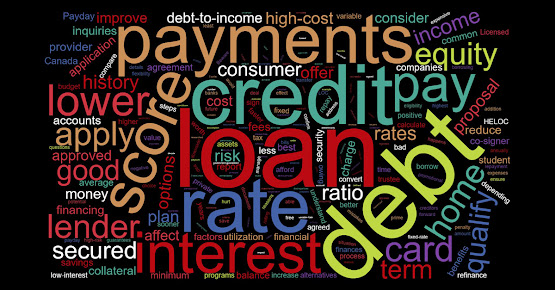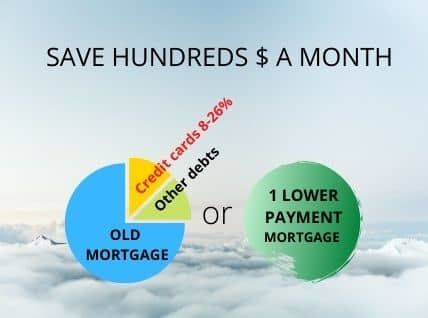📉🤑Debt Consolidation Using Home Equity or Second Mortgage💸🏡
Over the years the average Canadian consumer had more
than $72,000 of debt. And roughly one-third of that amount was non-mortgage
debt.
That includes an installment loan, credit card debt, and a
personal loan, all of which have much higher interest rates.
If you’re one of those consumers that’s looking for a way to
pay off that high-interest debt and own your home, a debt consolidation
mortgage might be the solution.
Let’s look at how these mortgages work and what you need to
consider before refinancing your home.
Why Should You Consider Debt Consolidation Using Home
Equity?
Debt consolidation is the process of combining several debts
into one, usually with a lower interest rate. This lets you pay off the
high-interest debt so more of your payment goes toward paying down the
principal.
For the last few years, mortgage rates have been historically
low, with lenders offering rates in the 2 percent range. Compare that to credit
cards which typically range anywhere from 18 percent to 25 percent.
It’s clear how consolidating into a mortgage can save you
money.
You could also lower your total monthly payment by making a
single payment on the mortgage rather than one for each debt. This can free up
cash flow for paying expenses, monthly savings, or investing.
Another side-effect of consolidating your debt is that it
can help improve your credit score. Mortgage balances are weighted differently
in the credit score calculation so moving balances from credit cards and other
high-interest debts can help.
How A Debt Consolidation Mortgage Works
When you consolidate using one of the mortgage options we
cover below, the lender adds the amount of the debts you’re consolidating to
the balance of your mortgage. Those funds are then used to pay off the various
debts.
In most cases, the lender will set a condition in the
mortgage requiring your lawyer to pay off the creditors on your behalf. If they
provided the funds directly to you, there’s a chance you could spend it on
something else and not pay off the debt it’s intended for.
That would leave you with a higher mortgage balance as well
as all the existing debt. This could impact your ability to pay and increases
the lender’s risk.
Secured Debt vs. Unsecured Debt
Before we get into the details about consolidating debts
with a mortgage, you must understand the difference between secured and
unsecured debt.
When a debt is secured, it means something of value is being
used as collateral for the loan. In the case of a mortgage, your home is the
collateral. If you don’t make the mortgage payments, the bank can foreclose on
your home to recover their money.
An unsecured debt doesn’t require any kind of collateral.
The most common example is credit card debt. In most cases, nothing is securing
the money you owe on your card. The credit card company lets you “borrow” money
based on how much of a risk they think there is that you won’t pay them back.
If you don’t pay the balance owing, they can take steps to
collect that money but they can’t repossess something you own or foreclose on
your home.
Types of Debt Consolidation Mortgages
Mortgages are not all created equal. There are several
different types of mortgages that you can use for debt consolidation purposes,
including:
- First
Mortgage Refinancing
- Second
mortgage
- Reverse
mortgage
A home equity line of credit (HELOC) is another consolidation
option as well. It’s similar to a mortgage in some ways but has some distinct
advantages and disadvantages.
First Mortgage Refinancing
A first mortgage is the primary mortgage on your home. If
you have one mortgage, as most people do, it’s a first mortgage.
There are a couple of ways you can pay off debts using a
first mortgage. First, if you’re buying a new home and getting a mortgage for
the first time, you can increase the amount you borrow to pay off existing
debt.
Consolidating debt with a new mortgage means you won’t have
to pay any penalties or fees for breaking an existing mortgage. This is one of
the lowest-cost ways to consolidate your debt.
Second, you can refinance an existing mortgage to roll the
other debt into it. With this option, you’re essentially borrowing enough money
to pay of your existing mortgage and the other debts.
The downside of refinancing is that you’ll have to pay some
extra costs. Most lenders charge a penalty for breaking your mortgage and
you’ll likely have to pay some legal fees as well.
Most lenders let you access up to 80% loan-to-value (LTV)
for your mortgage. This means you can borrow as much as 80 percent of the value
of your home.
For example, if your home is valued at $500,000 the mortgage
could be as high as $400,000 with an 80 percent LTV.
Keep that number in mind when considering whether debt consolidation is the right option for you.
Second Mortgage
A second mortgage is exactly what it sounds like — a completely
separate mortgage from the primary mortgage on your home. In most cases, a
different lender will hold this mortgage but it still uses your home as
security.
Second mortgages are, by nature, riskier for the lender. If
you default on the payments, the first mortgage holder will get paid before the
second mortgage holder. As long as there’s enough equity in your home, this
isn’t a problem but if they can’t sell your home for enough to cover both
balances, the second mortgage holder is the one who won’t get fully paid.
Because a second mortgage presents a higher risk to the
lender, interest rates are higher than other mortgages. They’re still
considerably lower than most credit cards and other unsecured debt though.
Second mortgage loans often target consumers with bad credit
or lower credit scores than many banks and other mortgage lenders are
comfortable with. If your credit score isn’t as high as you’d like, a bad
credit mortgage might be your best (or only) choice to consolidate debt.
Reverse Mortgage
A reverse mortgage is a type of financial instrument
available to homeowners who are 55 or older. These mortgages let you pull funds
out of the equity in your home, which you can then use to pay off other debt.
One of the benefits of a reverse mortgage is that
you don’t need to make any payments. Instead, the balance of the mortgage
increases each month — which decreases the amount of equity in your home.
When you sell your home, the amount owing on the reverse
mortgage goes to the lender.
This is a good consolidation option if you’re 55 or older
and on a fixed income. You won’t need to make payments on the mortgage but you
can free up the payments you’re currently making on the other debt.
Home Equity Line of Credit (HELOC)
A home equity line of credit, or HELOC, is similar to a
mortgage in most ways. It’s registered against the title of your home and is
secured by its equity, just like any other mortgage. The main difference is
that it’s a revolving line of credit.
Instead of getting a fixed amount of money, home equity
loans let you draw out money as you need it. You can also pay it down as
quickly as you like.
For example, you can use a HELOC to pay off your other
debts, consolidating them into the line of credit. But instead of making lower
payments as you might with a typical mortgage, you could continue paying the
same total amount each month and pay off the HELOC quicker.
There are early payment penalties on most other types of
mortgages so this isn’t always an option in that case.
Factors to Consider When Comparing Mortgage Options
When you’re comparing the different types of debt
consolidation loans, there are several factors you should consider, including:
- Interest
rates
- Approval
requirements
- Refinancing
costs
In some cases, your financial situation might limit your
options but these are all important to keep in mind.
Interest Rates
One of the most significant differences between the various
types of mortgages is the interest rate.
A first mortgage refinance has the lowest interest
rate of the different types. The rate depends on the length of the mortgage,
the value of your home, and various other factors but these mortgages can be as
low as 2 percent.
Home equity lines of credit and reverse mortgages are
generally the next lowest rates of the different choices for consolidating
debt. They often use a variable interest rate that’s based on the current prime
rate.
With a variable interest rate, there’s always a chance the
rate could increase. Rates have been at historical lows for a number of years
but even if they start to climb, you’ll still pay considerably less than the
average high interest rate debt.
A 2nd mortgage has a slightly higher rate of the various types of consolidation mortgages. These types of mortgage are usually the easiest to qualify for and don’t require you to break your existing mortgage in first position.
Approval Requirements
What you need to get approved for each type of mortgage is
another important difference. Your credit history and credit score will play a
part in determining which options are available to you.
Lenders like the major banks in Canada have the most strict
requirements. They’ll consider your credit score, your income, your monthly
cash flow, and various other factors that affect your ability to make payments.
While the mortgage is secured by your home, they don’t want
to take any risks when lending money. If there’s a chance you won’t be able to
pay them back, you likely won’t qualify.
A HELOC has similar requirements but some lenders will be a
little more flexible. Many HELOCs only require you to make interest payments
every month, not principal, so the payments may be lower. This gives the lender
a little more flexibility when deciding how much of a risk you are.
Many private second mortgage lenders focus on customers with
lower credit scores and less-than-perfect credit histories. This is one of the
reasons the interest rates are higher.
If you have bad credit, you’ll likely have the best chance
of being approved for a second mortgage.
Reverse mortgages have age requirements but if you’re over
55, you’ll likely qualify. Because there are no monthly payments required, your
ability to pay is mostly irrelevant. As long as there’s enough equity in your
home to cover the amount you borrow, you’ll likely qualify.
Consolidating Your Debt Using Home Equity Offers Several
Benefits
When you use a consolidation mortgage to pay off debt,
you’ll still owe the same total amount. So why would you want to consolidate it
into a single balance?
There are several benefits that come from consolidation.
Free Up Cashflow
Because mortgage interest rates are so much lower and the
terms are longer than most other types of debt, the single mortgage payment
will likely be quite a bit lower than the total of all the individual payments
you’ve been making.
This frees up cash flow in your monthly budget that you can put towards household expenses, savings, or simply paying off your mortgage faster.
Improve Your Credit Score
Paying off high-interest consumer debt will likely improve
your debt-to-credit ratio. This ratio is a measure of how much debt you’re
carrying compared to the amount of credit you have available.
This is one of the factors that impact your credit score so
paying off that debt will help improve your score.
Save Money In The Long Term
Credit cards and other consumer debt have much higher
interest rates than a typical mortgage. That means you pay more interest,
especially if you can only afford to make the minimum payments.
If that’s all you pay every month, virtually all of your
payment goes towards interest, leaving you with debt that takes years to pay
off. Consolidating it into your mortgage lowers the interest rate and if you
make extra payments, they go directly towards the principal.
Need To Consolidate Debt Using Your Home Equity?
Now that you’ve got a better idea of the pros and cons of a
debt consolidation mortgage, you’ll be able to decide if it’s the right choice.
In most cases, you’ll be better off after consolidating but there are a few
things to be careful of.
Due diligence is important when you make long-term financial
decisions so don’t rush into anything. Take your time to consider which option
is right for you.
Contact us today to discuss how our licensed mortgage
brokers can help you with your debt consolidation mortgage.










Comments
Post a Comment